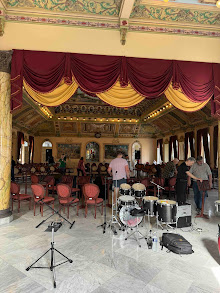Excerpt from YONAH by Neel Woods
Chapter 34
Oppressed
Nineveh was a city unlike anything I’d ever observed in Israel. From the near side of the Tigris River, I saw it was encircled by a wall that looked to be 100 feet high and half again as thick. Embedded within the massive wall were hundreds upon hundreds of guard towers twice as high as the wall itself. A dozen Jerusalems would not have matched the size of this metropolis.
The adjacent Tigris River was a wonder in itself at nearly a quarter-mile’s breadth from bank to bank. Israel’s Jordan River, at its widest point, spanned just 100 feet—not even a tenth of the mighty Tigris. A multilane bridge connected the east and west bank providing thoroughfare for foot traffic as well as chariots and wagons.
With every step across the bridge, I sensed the growing presence of evil, which was personified in the hateful stares I received from those I passed. I didn’t know which was more offensive to them—my foreign appearance or my beggar-like demeanor.
Once beyond the bridge, I stood before the huge River Gate that cast a long shadow over the Tigris. Three chariots abreast could have easily rolled through it. Traffic flowed in and out of this portal freely for as long as the sun shone. I began to pass through the gate unchecked, but a guard appeared holding a spear to my bare chest. Were it not for the safe passage I knew the Sovereign would grant me in my mission, I expect this would have marked the final moments of my life.
Taking me for a beggar from some nearby land, the guard didn’t bother speaking to me. He simply motioned for me to turn around and leave the city.
I squared my shoulders. “I have been sent to deliver an urgent message to all who live inside these walls.”
The guard was visibly astonished. Not only had I addressed him in a fluent Assyrian dialect of the Aramaic tongue, but I had made a bold and quite unexpected declaration, causing him to lower his sword and just stare at me.
Not knowing whether this was divine intervention or a lapse in the guard’s protocol, I didn’t wait to find out. I continued on past him through the gate without looking back, wondering with every step whether I’d feel his spear upon my back. Still unhindered several minutes later, I allowed myself to relax and set my focus on scouting out the city as to how to deliver my fateful message to a hostile audience. I spent my first full day walking from one edge of the Assyrian capital to the other, thinking about how, where, and to whom I would deliver my message.
From where I was standing just inside the River Gate, I could see the layout of the entire city. It was arranged in four quadrants, all of which converged at the city center where the king’s palace conspicuously overlooked everything within the city walls. One could not forget its imposing presence, even for a minute, as if it constantly eavesdropped on all that was done or said by its citizens.
As I began to walk, I saw numerous worship sites similar to those I encountered on the inbound road back west of the Tigris. I noticed both simple and grand altars erected in honor of one deity or another. There were a few sparse Asherah poles immediately recognizable by their explicit sexual connotations. Ba’al altars were more frequent. I shuddered to see how many of these were strewn with fresh embers and bones, some of which appeared more human than not.
Graven images of Dagon, introduced to Israel by the Philistines as another fertility god, frequented Nineveh’s streets as well. I found it darkly ironic that the Assyrians depicted Dagon as a merman—half man, half fish. I wondered if the Sovereign intended for my underwater journey to this land to play a role in my preaching to the men and women of Nineveh.
Another deity, exclusive to the Assyrians and known by the name of Nisroch, was portrayed as a man with an exaggerated muscular physique and the head of an eagle, so as to tout the nation’s military might.
By far the most prominent objects of worship, though, were statues of Ashur and Ishtar, the patron deities of the Assyrian empire. Ashur was depicted as an archer with magnificent wings, attired in military garb, and adorned with braided locks and beard. Assyrian kings all the way back to Ashur-uballit I, half a millennium earlier, took on the name of this god.
Ashur’s marital counterpart was Ishtar, believed to be the daughter of the moon god. She was also known as Ninua, from whence came the city’s name. Ishtar was the grand patroness of Nineveh and goddess of fertility. Other Canaanite nations knew her by her more common name, Asherah. Her image was always provocatively attired in nothing but bracelets and necklaces. Sometimes she would be postured atop a man indicating sexual dominance. Other images showed her with a newly killed beast in her hand or laid at her feet in recognition of her bloodlust for war and violence.
I observed many Ninevites, male and female, adorned with jewelry depicting their favorite deities. It was obvious a great deal of this people’s wealth, whether from the king’s coffers or the citizens’ own pockets, was spent in the depiction of their gods. Never before had I come across a culture that so intermingled commerce, fashion, and religion.
Droves of unattended children spilled out everywhere—huddled in corners, underneath fountains, leaning against storefronts, and laying in filth about the cisterns. They weren’t playing games, singing songs, or behaving in any manner I would expect of children back home in Gath-Hepher. Instead, they seemed lifeless, despairing, and afraid. I tried not to imagine the source of their distress but kept my head down and hurried my stride.
Out of the corner of my eye, I detected one particular child staring at me intently. When I looked up, I knew I must be hallucinating—the face I saw was Arwa’s! It was not the face of the woman she’d become. Instead, I beheld the baby-faced Arwa whom my father and the other men of Gath-Hepher had dragged back home from their Assyrian raid when I was but a child myself.
“Adonai, what is it You are causing me to see? And why?” I asked in my mind.
Silence.
When I looked at the face again, the resemblance was gone entirely. Why would Adonai toy with me like this?
Continuing on, I came to a quadrant along the northern city wall where I saw a mass of living spaces mashed together too densely to possibly afford any comfort or privacy. This was the residential quadrant where the Ninevites and their families sheltered from the brutal desert heat, ate their meals together, and slept. The dwellings looked fortified but uninviting.
Passing by the residential dwellings, I entered what appeared to be the market and trade vicinity where produce, weapons, clothing, jewelry, religious figurines, and various other items, some vital and others indulgent, were bartered and sold. The food smells were mostly unfamiliar to me, and I got a sudden longing for the luscious fruits and vegetables of Galilee. I saw women, in groups or alone, bands of children, and whole families walking around together surveying the goods. The variety of activities and commerce in this region was on a scale like nothing I had ever heard of, much less seen. Not surprisingly, this appeared to be the busiest section of the city.
I passed through the streets sizing up my audience until I approached the southeast quadrant of the walled metropolis. It stood several hundred feet above the rest of the city atop several large hills. Only the king’s palace rivaled this area in height. I could see individuals and groups ascending and descending the hills, which were populated with grandiose temples glittered with various tints of shiny metals and stones as if to boast the superiority of the gods they housed.
Surrounding the hills of worship were expansive pasture areas containing a menagerie of livestock and other strange beasts not seen in Israel. I noticed much buying and selling in that vicinity. I didn’t know why upon my first observation, but I would soon regret to discover the reason.
As the sun set, I started to come full circle toward the River Gate where I began. I knew from the rank air that I was approaching the military district. It was draped in a dingy cloud of smoke, and I thought I could hear occasional screams and anguished cries emanating from men and women alike in its vicinity.
Here I found legions of soldiers conducting fighting drills. I also observed a penal colony of prisoners who had been captured from neighboring nations.
This was where I first saw evidence of the Assyrian cruelties my father told me about as a child. I had known since my early years that armies throughout the Assyrian realm prided themselves in finding new ways to inflict cruelty on their enemies, but the nightmares those stories evoked in my young imagination could not have matched the realities I encountered.
I walked unnoticed alongside a field encircled by a high fence that appeared to be an internment camp. I saw the prisoners inside, clearly malnourished, broken-spirited, and heavily worked. Many had obviously been tortured by their captors.
This malicious sight paled, however, in comparison to what I saw strewn along the southbound road beyond the gate of this quadrant’s wall, which followed the great river from Nineveh toward the city of Ashur and beyond that, to embattled Babylonia. This gate had long been known as the Ashur Gate, but because of Nineveh’s military dominance in the past century, it had come to be more commonly known as the Blood Gate. It was through this massive portal that the king’s army marched their captives to the prisons and dungeons awaiting them. In earlier times, this spectacle was a source of revelry for Ninevite citizens of all ages. They would sit atop the south wall to jeer and throw rocks and filth at the dejected foreigners as they were prodded toward the foul accommodations, where they would mark time until they breathed their last. The allure of these occasions eventually turned sour, however, as the cruelty inflicted by the Assyrian soldiers became unsavory even for the merciless Ninevites.
My mouth went dry as I studied the extent of their cruelty: Asherah poles, lining both sides of the southern road—human beings impaled upon them. Whenever a prisoner collapsed from exhaustion, no matter their age, they were unbound from the procession and handed over to the largest of soldiers, who would hoist them up into the air and mount them atop one of the poles. Then the prisoner’s arms and legs would be bound below so the pole would ever so slowly grind its way into their torso, and eventually impale them.
A particular form of savagery was reserved for those prisoners who were found to be kings, officers, and nobles of the conquered tribe. To break the spirits of the rest of the prisoners, these dignitaries were mounted on poles around the prison area and lit on fire to serve as human torches. Their screams could be heard for hour upon agonizing hour. It was unfathomable to me how a fellow human being could become numb to inflicting such suffering.
I spent three grueling days walking about the city and silently observing the Ninevites’ decadence with my own eyes. By the end of those three days, my spirit felt oppressed as if I were a fellow partaker in this society’s evils. What was I supposed to say to these people if their own perversions and immorality had suppressed the voice of my God, the One who’d sent me here from the beginning?
I felt a sudden urgency to get out of the city. Everything I had seen, heard, and smelled gave me an overwhelming compulsion to pray, to fast, and to purge my soul of the filth it had been subjected to since the moment I’d walked through the River Gate.
There was another gate on the east wall of Nineveh opening toward the fertile, mountainous land of Urartu that was populated by sheep and goat herders, cattle ranchers, and farmers. The influx of traffic from that region caused this gate to become known as the Shepherd’s Gate.
Still dressed in smelly rags, I exited this gate in the early morning with only a few days’ meager rations of bread and figs. I was already dreading my return to the city the following day.
Within an hour, the road I was on began to ascend into the foothills, and traffic had all but ceased. I found an overlook near enough that I could sit and survey the entirety of Nineveh, yet distant enough for me to exhale my recent days’ experiences and inhale, once again, the holy presence of the God of my people.
As I laid myself before Adonai, I could feel His pleasure in my obedient response to get myself to Nineveh. Was He aware of my unwavering abhorrence for these Assyrian people? Of course! He sees into the minds and hearts of everyone.
Shame washed over me because of my inward hope that this population would disregard my message of repentance, or else, pending doom. How I yearned for the Sovereign to have already decreed a certain outcome for this city so I could speak definitively and not offer them a means to escape judgment!
I wondered if my revulsion for these people might soften my declaration of judgment and perhaps cause them to disregard it, thereby disqualifying themselves from whatever grace the Sovereign might be inclined to bestow. Only the Sovereign knew. I just needed to do what He asked of me.
The next morning, I pretended to remain in prayer outside the city, but it was nothing more than procrastination. I knew from conviction, as well as painful personal experience, that God cannot be fooled.
At last, I picked myself up and willed my feet down the hill from my place of rest to complete my mission.






Comments
Post a Comment